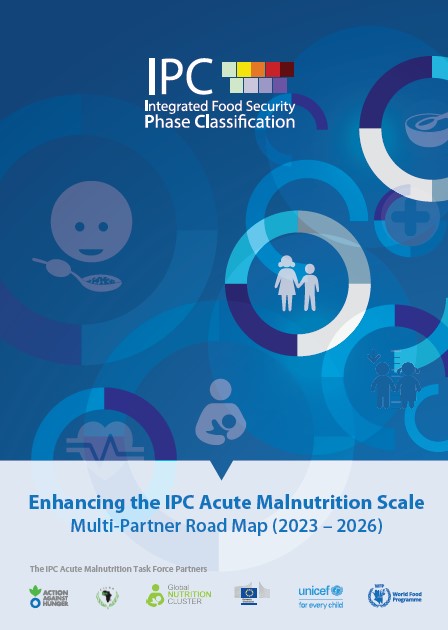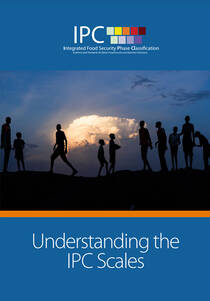The IPC Acute Malnutrition Taskforce
About the IPC Acute Malnutrition Taskforce
- The IPC Acute Malnutrition (AMN) Task Force is composed of members of the IPC Global Support Unit and six IPC Global Partner organisations with a nutrition mandate, namely Action Against Hunger (ACF), Comité Permanent Inter-États de Lutte Contre la Sécheresse au Sahel (CILSS), The Joint Research Centre of the European Commission (JRC), the Global Nutrition Cluster (GNC), UNICEF, and the World Food Programme.
- The vision of this Task Force is to ensure that, together with IPC Acute Food Insecurity (AFI) analyses, the IPC Acute Malnutrition analyses meet the evolving information needs of decisions makers and systematically inform improved food security and nutrition funding, policy and programming decisions at levels appropriate to the needs in all countries where acute malnutrition is of concern.
- The overall purpose of the task force is to lead the collective development and implementation of a road map that provides the framework to enhance the IPC Acute Malnutrition scale overall and analyses in order to better inform decision-making, including resource allocation, policy, programming etc.
- Specifically, the task force fulfills the following functions:
- Develop a road map to lay out actions to be taken, entities/people responsible, contributions from others, targets and timeframe.
- Lead the implementation of the road map.
- Monitor progress and identify adjustments and/or other action required to overcome arising challenges, including through increased collaboration and coordination among partners.
Download Term of Reference
The IPC AMN Roadmap
Developed in consultation with the nutrition agencies in the IPC partnership as well as other global experts, the IPC AMN roadmap aims to enhance the coverage of the IPC AMN scale and in the same time, ensure quality and relevant IPC AMN analyses. The IPC AMN roadmap sets out priority actions in line with the IPC Global Strategic Programme 2023-2026.
Download The Acute Malnutrition Roadmap 2023-2026
Hover over an event to view the details and click to add it to your calendar.
IPC Acute Malnutrition Scale Explained!
The IPC AMN scale
- IPC Acute Malnutrition (IPC AMN), one of the 3 IPC scales, is a set of protocols to classify areas based on the severity of acute malnutrition, identify major contributing factors to acute malnutrition, and provide actionable knowledge by consolidating wide-ranging evidence on acute malnutrition and contributing factors. It is a process for building technical consensus among key stakeholders. The classification of acute malnutrition focuses on identifying areas with a high proportion of acutely malnourished children that require urgent action.
- Developed in response to an increased demand to complement the IPC Acute Food Insecurity (IPC AFI) scale, after 3 rounds of piloting and revisions, the IPC AMN was finalised in 2016. The IPC AMN has since become the recommended methodology for nutrition situation analysis for areas with high levels of acute malnutrition.
Understanding the IPC Scales
The IPC provides a common scale for classifying the severity and magnitude of food insecurity and acute malnutrition, which improves the rigour, transparency, relevance and comparability of food security and nutrition analysis for decision-makers. Download (en) Télécharger (fr)
Acute Malnutrition Task Force Members
Action Against Hunger (AAH) is an international humanitarian organization committed to ending child hunger. Recognized as a leader in the fight against malnutrition, AAH saves the lives of malnourished children while providing communities with access to safe water, mental health and care practices, food security and sustainable solutions to hunger. Since its initial development, AAH has been actively involved in the IPC initiative at all levels – national, regional and global.
Comité Permanent Inter-États de Lutte Contre la Sécheresse au Sahel (CILSS) is the Permanent Inter-State Committee for Drought Control in the Sahel. CILSS and its partners (UN agencies, NGOs and other institutions) have been engaged in the development and implementation of the Cadre Harmonisé (CH) for the analysis and identification of areas at risk and populations affected by food and nutrition insecurity in the Sahel and West Africa. Like the IPC, the CH produces relevant, consensual, rigorous and transparent analyses of current and projected food and nutrition situations. The CH and the IPC generate analyses findings that are comparable. Over the years, CH and IPC partners have been working closely to harmonize their tools and processes and promote cross-learning and mutual support in various areas of work, including technical development, analysis, quality assurance and communication. The CILSS and its partners in the region operate in partnership with the IPC Global Unit. CILSS is also a member of the IPC Steering Committee.
The Joint Research Centre (JRC) of the European Commission is the evidence-based, customer- driven in-house scientific service of the European Commission. The JRC is providing scientific advice and technical know-how to support a wide range of EU policies. It is one of the founding members of the IPC Global Partnership and has been since 2007 a key player in steering and developing the initiative. The JRC contributes to scientific and technical developments of the IPC as well as country support and capacity building. It is also directly supporting the improvement of the Cadre Harmonisé in West Africa and its convergence with the IPC.
The Global Nutrition Cluster (GNC) exists to collectively strengthen the technical and coordination capacities for nutrition in countries, based on the needs of affected populations. This is to enable countries to forecast nutrition trends and prepare for, respond to and recover from shocks during humanitarian emergencies, thereby contributing to global efforts to prevent and treat malnutrition in all its forms.
UNICEF works in 190 countries and territories to save children’s lives, to defend their rights, and to help them fulfil their potential. UNICEF works to protect the right of every child to good nutrition, health, education, and protection from neglect and violence, including in humanitarian crises. UNICEF’s Executive Director chairs the Lead Group of the Scaling Up Nutrition (SUN) Movement and UNICEF is the lead agency of the Global Nutrition Cluster – highlighting UNICEF’s commitment to nutrition for every child, in all contexts. UNICEF has been providing technical guidance and advice to the IPC Global Partnership since 2013 and contributing vital technical insights to the development of the IPC acute malnutrition scale. Currently UNICEF is actively participating in all levels of the IPC governance structure, the Steering Committee, the Technical Advisory Group and the Nutrition Technical Working Group. UNICEF works closely with key partners to implement IPC analyses at regional and country levels.
The World Food Programme (WFP) of the United Nations is the world's largest humanitarian agency fighting hunger worldwide by providing food assistance in more than 120 countries. Since its initial development, WFP has been actively involved in the IPC system development and has joined the multi-agency partnership to closely work with the other partners on the adaptation of the IPC to other countries and contexts. With an active engagement at each level of the IPC Governance structure, WFP plays a critical role in both the technical development of the IPC acute scales and in conducting analyses at country level. WFP is also a major data provider to the IPC analysis processes at country level.
Join our mailing list






